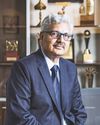The Success Of An Organisation Is Deeply Affected By The Decisions Of The Ceo. We Look At Some Of The Worst, So You Can Learn From Where They Went Wrong.

But how much can you really learn from success? Take Steve Jobs, who built the massive Apple empire from scratch, for example. Can we identify the crucial factor to his success? Was it his powerful drive? His marketing savvy? Or something completely different?
The causes of failure, on the other hand, can be a lot easier to pinpoint, especially when they bring a previously successful organisation down. And while it’s a truism that we learn best from mistakes, those mistakes don’t have to be our own.
We look at seven of the worst CEOs in history and what they did to earn that label – so you can make sure you don’t follow suit.
KAY WHITMORE EASTMAN KODAK This story is one of complacency and lack of vision. In 1990, Kay Whitmore’s first year as CEO of Kodak, he famously fell asleep in a meeting with Bill Gates at which integrating the company’s products with Windows was being discussed.
Indeed, despite the fact that Eastman Kodak had actually developed the digital camera in 1975, Whitmore refused to take the technology seriously and failed to invest. As digital started to take over the world, the company fell into decline. Whitmore was fired after three years, mainly for failing to cut costs enough.
Lesson: Whitmore’s background was squarely in film, and he failed completely to see the opportunities in the digital world.
KEN LAY ENRON
This story is from the April 2019 edition of The CEO Magazine India.
Start your 7-day Magzter GOLD free trial to access thousands of curated premium stories, and 9,000+ magazines and newspapers.
Already a subscriber ? Sign In
This story is from the April 2019 edition of The CEO Magazine India.
Start your 7-day Magzter GOLD free trial to access thousands of curated premium stories, and 9,000+ magazines and newspapers.
Already a subscriber? Sign In

In The Best Of Corporate Health
Under the leadership of chairman and managing director Dilip Surana, micro labs is showing no signs of slowing down in its quest to become one of the world’s leading generic pharmaceutical companies.

“OUR FOCUS IS ON OUR CUSTOMERS.”
BONFIGLIOLI TRANSMISSIONS COUNTRY MANAGER KENNADY V KAIPPALLY TALKS INNOVATION, CUSTOMER SATISFACTION AND THE POWER OF A STRONG BUSINESS CULTURE.

WE ALL TREAT EACH OTHER WITH RESPECT.“
WHEN COVID-19 STRUCK SOUTH ASIA, BD INDIA MANAGING DIRECTOR PAVAN MOCHERLA FOUND WAYS TO KEEP HIS ASSOCIATES SAFE WHILE CONTINUING TO PRODUCE THE TOOLS HEALTHCARE WORKERS NEED TO COMBAT THE VIRUS.

WE ARE ENJOYING A CONSTANT DEMAND FOR OUR PRODUCTS.
POTATO WAFERS AND OTHER SNACK FOODS HAVE PROVEN TO BE THE GOLDEN TICKET FOR CO-FOUNDER AND MANAGING DIRECTOR OF BALAJI WAFERS, CHANDUBHAI VIRANI.

Walking on water
RELIABLE ACCESS TO ELECTRICITY CAN UNLOCK OPPORTUNITIES FOR INDIA’S RURAL COMMUNITIES. AS CHAIRMAN AND MANAGING DIRECTOR OF NATIONAL HYDROELECTRIC POWER CORPORATION, ABHAY KUMAR SINGH IS DETERMINED TO DO AS MUCH AS HE CAN FOR THIS CAUSE IN THE NEXT TWO YEARS.
LEAN MACHINE
AS CEO, THOMSON JOSEPH HAS EQUIPPED TRÜTZSCHLER INDIA WITH THE TOOLS TO DO MORE WITH LESS. WHAT A TIMELY JOURNEY IT HAS PROVEN TO BE.

THE CUSTOMER IS KING.
AS EXECUTIVE DIRECTOR OF THE DISTILLERIES COMPANY OF SRI LANKA, ROYLE JANSZ UNDERSTANDS THAT THE RECIPE FOR SUCCESS IS A BLEND OF CONSISTENT QUALITY AND TREATING CUSTOMERS LIKE ROYALTY.
The WARTIME CEO
LEADERS MUST ADOPT THE MENTALITY OF BEING AT WAR IF THEY WANT TO SURVIVE THE NEXT 24 MONTHS, SAYS EXPERT LYNDALL SPOONER.

Challenges excite me.
WITH A FOCUS ON DIFFERENTIATION AND VALUE CREATION FOR ITS CUSTOMERS, ASHWANI SHARMA, PRESIDENT AND CEO OF ASEPTO, UFLEX GROUP’S ASEPTIC LIQUID PACKAGING ARM, SHARES HOW THE BRAND HAS TRANSFORMED THE ASEPTIC LIQUID PACKAGING INDUSTRY.

A MATERIAL WORLD
WITH 40 YEARS’ EXPERIENCE AT MATERIALS MANUFACTURER TORAY INDUSTRIES UNDER HIS BELT, CHIEF REPRESENTATIVE FOR INDIA SHIGEKAZU SUENAGA HAS LEARNED THAT FEW THINGS ARE MORE IMPORTANT TO A BUSINESS THAN INNOVATION, COMMUNICATION AND CONSISTENCY.